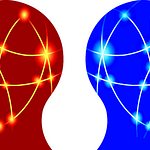I have a tough time remembering names even though I can easily remember faces, events, ideas and concepts. Does that mean I have poor memory? The answer to that is not so straightforward.
Our brain has short-term, long-term and working memory.
Here’s a simple diagram that illustrates the co-relation.

Sensory Memory
Input from the senses is placed in a short-term (really short-term) store called as sensory register or sensory memory. To give you an idea of the time-frame involved, visual input from the eyes remains in sensory memory for 1 to 2 seconds. Auditory input from the ears has a slightly longer time of 5 seconds.
Based on the senses, scientists have given different names to the sensory memory.
Visual Memory involves the ability to store and retrieve sensory input from the eyes. This is also referred to as iconic memory. When a person can vividly recall an enormous amount of visual information with extreme accuracy after only a short exposure, that person is said to have an eidetic or photographic memory.
Spatial memory is a special aspect of visual memory related to one’s environment and its spatial orientation. If you can read maps well and remember routes well, then your spatial memory is good.
Echoic Memory – you got it – from the ears (that is the sound echoing in your ears!) Musicians, in general, have a good echoic memory and recall notes of snippets of music they heard.
Haptic Memory is related to touch. Can you remember the touch of a special person or the way a particular item of clothing felt when you wore it? I still remember the touch of a particular dress my mother wore when I was a child. That is my haptic memory speaking. Generally, people using Braille have a good haptic memory.
Olfactory Memory is related to smells. Those dealing with perfumes, I am pretty sure, have excellent olfactory memory. Are there any particular smells that remind you of specific events or environments from your past? That is your olfactory memory showing its presence.
Gustatory Memory is related to taste. Some people can recall precise details of how a dish tasted like while others will just tell you the taste was good or bad.
The important thing to remember is that sensory memory is fleeting – lasts just seconds. How then can someone remember something that they saw decades ago? The answer is that through attention (either implicit or explicit), they were able to transfer the fleeting sensory input and memory to their short-term and subsequently long-term memory.
It is interesting to note the importance that Leonardo da Vinci, one of the most intelligent persons of all times, gave to the senses. In fact, nurturing the senses was one of his principles of creativity and intelligence. “Sensatsione! Use your senses,” he said.
Leonardo regularly cultivated and refined his senses. In his journal, he noted:
The average human being looks without seeing, hears without listening, touches without feeling, eats without tasting, moves without physical awareness, inhales without awareness of odor or fragrance, and talks without thinking.
The five senses are the ministers of the soul. ~ Leonardo da Vinci
Want to improve your memory? Pay attention to the five senses and what they tell us.

